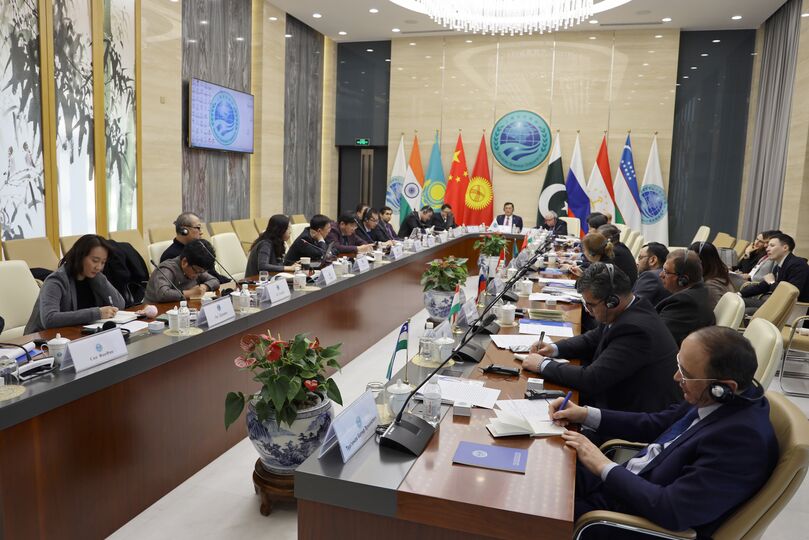On 9 January 2019 the SCO Secretariat held a roundtable discussion on Afghanistan with experts and researchers of the China Institute of International Studies, the China Institutes of Contemporary International Relations, the Chinese Academy of Social Sciences, the Chinese Association for East European, Russian and Central Asian Studies as well as Permanent Representatives to the SCO Secretariat from India, Kazakhstan, Kyrgyzstan, Pakistan, Russia, Tajikistan and Uzbekistan, as well as diplomats from the Pakistan's Embassy in the People's Republic of China and the Chinese Foreign Ministry.
The participants of the roundtable discussion exchanged views on the current situation in Afghanistan, prospects for the intra-Afghan dialogue and also elaborated on the SCO role and the capabilities of the SCO-Afghanistan Contact Group to facilitate the establishment of peace and stability in Afghanistan.
SCO Secretary-General Vladimir Norov stressed in his speech the significance of holding the roundtable in view of the need to objectively analyse the situation unfolding in Afghanistan and its impact on stability and security in the region in general.
The Secretary-General offered a detailed vision on each item on the agenda of the roundtable.
It was noted in relation to the current situation that 2019 broke records in terms of the number of terrorist attacks committed by local militants. Of special concern is the concentration of armed opposition in the Afghanistan border areas including terrorist groups with Central and South Asian nationals.
The production of narcotics is reported to be steadily growing. According to various estimates, it amounts to 65 percent of revenues made by terrorist and extremist forces. Manufacturing of synthetic drugs, which are enjoying growing demand abroad due to their relatively low prices, is also growing. In this connection, the SCO role in countering drug-trafficking is considerably increasing.
Speaking about progress in the Afghanistan peace process, the Secretary- General noted the need to settle the situation via political and diplomatic means and underscored that the SCO backs Afghanistan's government and people's efforts to restore peace and promote economic development of the country, to counter terrorism, extremism and narcotics-related crime.
The SCO supports negotiating and dialogue formats put forward by the SCO member states or upon their initiative or with their immediate involvement, including the Moscow format of consultations, the Tashkent process, consultations with special representatives of Russia, China, the US and Pakistan, and other multilateral platforms.
Vladimir Norov, regarding Afghanistan's active cooperation with the SCO, noted that it has been an observer state since 2012. As early as 2005, a protocol was signed on establishing the SCO-Afghanistan Contact Group that was brought into action in 2017 at the level of deputy foreign ministers. The Group approved a roadmap last year, which envisages joint actions to enhance cooperation in security, trade, the economy as well as cultural and humanitarian ties.
He emphasised the fact that the SCO treats the Afghan territory not only as a source of threats but also as a space of opportunities. One of the key elements in restoring the country must be its involvement in the formation of regional transport routes by expanding air, automobile and railway freight shipments, which is in line with the SCO initiatives of the Greater Eurasian partnership, Belt and Road Initiative and the national strategies of the organisation's member states. For instance, the Hairatan to Mazar-e-Sharif railway and currently designed railways from Mazar-e-Sharif to Herat and Mazar-e-Sharif to Peshawar could provide new transregional corridors with direct access of Eurasian nations to sea ports in India, Iran and Pakistan.
Experts gave a positive evaluation of the positions and arguments voiced by the Secretary-General and also shared their ideas on the situation in Afghanistan, its impact on the SCO countries and, in particular, on the Central Asian states.
The situation on Afghanistan's external borders was said to remain permanently tense. The on-going efforts of the US and its allies since 2001 to settle the situation in Afghanistan are costly and inefficient. In the past years, the military political situation in the country has deteriorated while Afghan society is becoming increasingly radicalised.
According to some experts, Central Asian nations may face threats coming from terrorist groups based in the IRA, while others stressed that the predicted threats from Afghanistan are grossly exaggerated.
Opinions converged on the issue of growing drug production and its impact on improving the financial situation of terrorist and extremist groups as well as on other countries that are destinations for Afghan drugs.
The withdrawal of coalition forces, according to the experts, will apparently create a vacuum of power in the country, which calls for the need to speed up intra-Afghan dialogue.
Meanwhile, it was noted that the SCO has a great potential for assisting in the socioeconomic development of the IRA and engaging Afghan youth in a positive agenda.
The Permanent Representatives to the SCO Secretariat from India, Kazakhstan, Pakistan, Russia and Uzbekistan issued briefings on the positions of their countries on the above issues.
Wrapping up the roundtable discussion, the SCO Secretary-General stressed that Afghanistan should be regarded not only as threat but also a promising partner. In this connection new sources for the country's economic growth must be created, demand for Afghanistan's agricultural produce must be increased and its industry and infrastructure supported so as to integrate Afghanistan in the regional economy.
The event was held in a friendly and constructive atmosphere.
